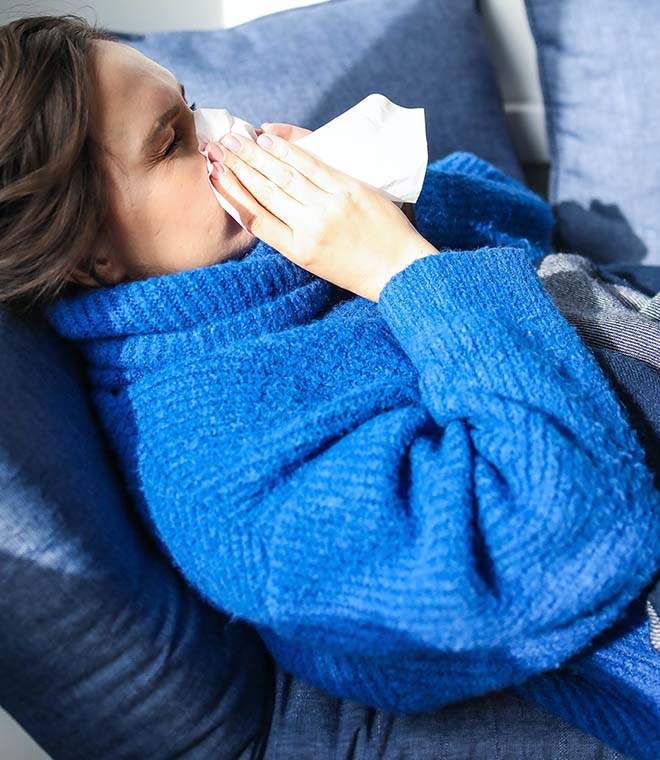Health
Coughing from allergies: What you need to know
By Sanjay “Jay” Patel, DO | Allergy & Immunology Aug 21, 2024 • 6 min
If you suffer from allergies, it can be difficult to know whether symptoms are caused by allergies or an illness, such as a cold, the flu or COVID-19. Coughing is a common symptom of various conditions.
Can allergies cause coughing?
Coughing can result from allergies. To understand how, you first need to know why allergic reactions happen. When you come in contact with an allergy trigger or allergen, your body mistakes it as a threat and responds as it would to a virus or bacteria. Your immune system releases histamine and other chemicals to fight off the perceived threat.
An allergic reaction often leads to an increase in mucus production. Mucus may build up in your nasal passages and drip down into your throat. The presence of mucus in your throat may then trigger your cough reflex to help clear your airways. Other times, pollens and allergens can be inhaled into the lungs, leading to a dry cough or asthma flare.
What are the characteristics of coughing due to allergies?
Coughing due to allergies is often dry, meaning you don’t cough up phlegm or mucus. Allergy coughing is also likely to be chronic, lasting eight weeks or more. You may also notice that you only develop a cough during certain times of the year, such as in the spring or summer. Other times, your symptoms could be a warning sign that you’re developing asthma or other chronic health condition, which should be evaluated by your healthcare provider. If your cough persists year-round, it may worsen when allergens you’re sensitive to, such as ragweed or grass pollen, are most prevalent outdoors.
If your cough is due to allergies, you may experience other symptoms, such as:
- Nasal congestion
- Sore or scratchy throat
- Sneezing
- Itchy, watery eyes
- Itching of the nose and throat
- Dark circles under the eyes
How do you treat a cough due to allergies?
An allergy treatment plan can reduce your symptoms if your cough is due to allergies. Steps for managing allergies may include:
1. Avoiding triggers: Your healthcare provider can order tests to determine the cause of your allergy. You can then work together to identify ways to limit your exposure to the specific allergens that trigger your cough and other symptoms. Your provider may also recommend measures such as wearing protective glasses or masks to avoid inhaling your allergens.
2. Oral medications: Antihistamine medications work by interfering with the actions of histamine. They are available in both over-the-counter and prescription strengths. There are also additional types of oral prescription drugs that block other chemicals that can lead to allergy symptoms. Depending on what you’re allergic to, you may need to take oral medications year-round or only during certain seasons. You may also benefit from taking medications preventively before you’re exposed to allergens.
3. Nasal sprays: Available over the counter, allergy nasal sprays administer medication directly to the nasal passages. Some are antihistamines, while others contain corticosteroids or other ingredients that reduce inflammation and treat allergy symptoms. Your healthcare provider may also recommend using a saline nasal spray, a saline nasal wash or a neti pot to thin mucus and reduce postnasal drip.
4. Immunotherapy: Administered via injection or as a medication that you place under your tongue, immunotherapy exposes you to certain allergens. Over time, this exposure can help build up your tolerance to allergens to reduce your symptoms. This is usually a longer-term treatment aimed at training your immune system to be less reactive to your allergies instead of relying on medications that treat symptoms.
5. Easing your cough: Your healthcare provider can recommend treatments for your cough, such as:
- Over-the-counter cough medicines, which suppress your cough reflex
- Increasing your intake of fluids to thin mucus
- Drinking hot beverages
- Sucking on cough drops or sugar-free candy
- Taking a spoonful of honey or mixing honey into a warm beverage
How do you know if a cough is due to allergies or something else?
Infections, asthma, gastroesophageal reflux disease and other medical conditions, such as cancer, can also cause coughing. Because it can be difficult to determine the cause of a cough on your own, it’s important to see your healthcare provider.
Updated August 2024.
Sources:
- https://www.aaaai.org/tools-for-the-public/allergy,-asthma-immunology-glossary/allergy-defined
- https://sncs-prod-external.mayo.edu/hometown-health/speaking-of-health/is-it-an-allergy-or-the-common-cold
- https://www.yalemedicine.org/news/seasonal-allergies
- https://sncs-prod-external.mayo.edu/hometown-health/speaking-of-health/why-are-you-coughing-so-much
- https://acaai.org/allergies/symptoms/cough/
- https://www.aaaai.org/tools-for-the-public/allergy,-asthma-immunology-glossary/chronic-cough-defined
- https://health.clevelandclinic.org/allergies-cause-sore-throat
- https://my.clevelandclinic.org/health/diseases/8610-allergies#management-and-treatment
- https://my.clevelandclinic.org/health/symptoms/17755-cough



